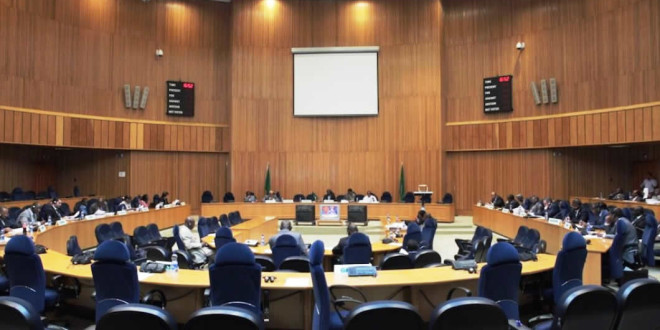This letter is available in English and French.
An Open Letter to H.E. Mme. Nkosazana Dlamini-Zuma, Chairperson of the African Union Commission, from South Sudanese and International Non-Governmental Organizations
Cc: Ambassador Smail Chergui, Chairperson, AU Peace and Security Council
CC: Alpha Oumar Konare, AU High Representative for South Sudan
1 November 2016
Your Excellency,
We, the undersigned South Sudanese and international non-governmental organizations, write to share our thoughts with you on the way forward for the Hybrid Court for South Sudan (HCSS). We recognize the efforts made by the African Union Commission (AUC) to date, as outlined in the Draft Project Proposal for Establishment of the Hybrid Court for South Sudan.1
We suggest that the AUC proceed on two fronts: (1) Prepare a draft statute for the HCSS in consultation with relevant stakeholders and ensure that it is enacted through appropriate legal processes as soon as possible, and (2) immediately establish an evidence preservation mechanism as a precursor to the full operationalization of the HCSS.
As you are aware, commitments at the state level in South Sudan and at the continental level in the African Union Peace and Security Council provide ample authority for the AUC to move ahead with the establishment of the HCSS.
The August 2015 Agreement on the Resolution of the Conflict in the Republic of South Sudan (ARCSS), the Government of the Republic of South Sudan, the Sudan People’s Liberation Movement-in-Opposition (SPLM-IO) and other stakeholders formally committed to the establishment of the HCSS “by the AUC to investigate and prosecute individuals bearing criminal responsibility for violations of international law and/or applicable South Sudanese law committed from 15 December 2013 through the end of the transitional period.”
One month later, in September 2015, the AUPSC, meeting at the level of heads of state and government, authorized the Chairperson of the AUC, “to take all necessary steps towards the establishment of the HCSS, including providing broad guidelines relating to the location of the HCSS, its infrastructure, funding and enforcement mechanisms, the applicable jurisprudence, the number and composition of judges, privileges and immunities of Court personnel and any other related matters.”
We would encourage the AUC to solicit input from South Sudanese stakeholders and individuals with technical expertise on the inner workings of international and hybrid tribunals. In addition to providing specific details relating to the court’s location and jurisdiction, the statute should also address matters such as victim and witness protection, public outreach, and the participation of South Sudanese judges and staff. The draft statute could be shared with interested parties for input prior to its adoption through appropriate legal mechanisms. Once the statute is adopted, the HCSS will then be in a position to recruit staff and develop its Rules of Procedure and Evidence, again with input from relevant stakeholders, so that it becomes fully operational in a timely manner.
The AUC should immediately deploy an evidence preservation mechanism to help compile evidence for later use in criminal trials. Evidence of crimes under international law is being lost or destroyed on a daily basis in South Sudan and it is vital that an official body be deployed to catalogue this information, as has been done as a precursor to the establishment of international and hybrid tribunals in other contexts. The mechanism could then be incorporated into the HCSS once it is formally established. We also urge your office to put in place a victim and witness protection unit to ensure that suitable protection measures are put in place during this phase.
Your Excellency, we thank you for your consideration of our ideas for a way forward for the HCSS in South Sudan. Our organizations stand ready to engage with the AU as it proceeds with the establishment of the HCSS, and in particular to provide comments on the draft statute. We look forward to information from your office of any further developments regarding the establishment of the HCSS.
Signed,
- African Centre for Transitional Justice
- African Centre for Justice and Peace Studies
- Africa Legal Aid
- Amnesty International
- Cercle International pour la Défense des Droits de l’Homme, la Paix et l’Environnement
- Coalition for the International Criminal Court
- Centre for Development of International Law
- Darfur Bar Association
- Dialogue Research Initiative
- East and Horn of Africa Human Rights Defenders Project
- End Impunity Organization
- Enough Project
- Foundation for Democracy and Accountable Governance
- Foundation for Human Rights Initiative
- Human Rights Development Organization
- Human Rights Watch
- International Federation for Human Rights (FIDH)
- Jonglei Development Agency
- Transitional Justice Working Group
- International Youth for Africa
- International Refugee Rights Initiative
- Never Again Coalition
- Peace Coalition of South Sudan (PECOSS)
- SIHA Network-The Strategic Initiative for women in the Horn of Africa
- South Sudan Christian Community Agency
- South Sudan Human Rights Society for Advocacy (SSHURSA)
- South Sudan Law Society
- Soweto Community Based Organization
- Standard Action Liaison Focus
- SUDO (UK)
- Universal Intervention and Development Organization (UNIDO)
- UNYDA (South Sudan)
- Voice for Change
- World Federalist Movement-Institute for Global Policy
 African Centre for Justice and Peace Studies ACJPS | المركز الافريقي لدراسات العدالة و السلام
African Centre for Justice and Peace Studies ACJPS | المركز الافريقي لدراسات العدالة و السلام




